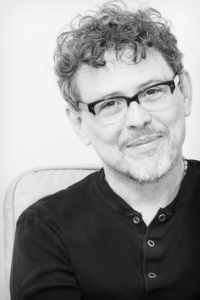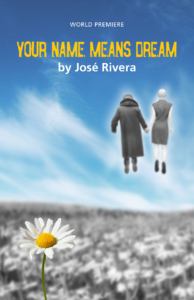Interview with José Rivera
Researched, interviewed, and edited by Sharon J. Anderson, CATF Honorary Board Member
CATF: In 2007, you compiled 36 Assumptions About Playwriting – “an unscientific, gut-level survey in no particular order of importance” – based on your teaching of writing from second grade to graduate school. The 13th assumption is, “Invest something truly personal in each of your characters, even if it’s something of your worst self.” What truly personal something did you invest in each of the characters in this play?
JR: With Aislin [older, in poor health], I invested a deep-seated suspicion of technology, not always and not all technology. When Aislin says to Stacy [an A.I. entity], “You are nothing but a toaster. We can be together for a thousand years. It doesn’t mean that we will be friends” – that skepticism, that hostility expresses my worries about how the encroachment of machine intelligence will diminish our humanity.
As a father of two, I have a strong paternal instinct and a caretaker reflex when I see people in need. Stacy definitely inherits that trait in that she will basically do anything to help Aislin stay healthy and live longer. Stacy is also a fount of information. I envy that quality and wish I was like that.
From the beginning, Aislin is the defender of being human despite the fact that she seems to be unhappy about being human.
Aislin recognizes the intangibles to being human that can’t be captured in digital. From her perspective, we take one step forward and two steps back. One moment you want to kill yourself, the next moment you’re hit by lightning and get an amazing realization that to be human is to live in a constant state of contradictions.
Machinery works consistently. Every time you push a button, you get the same results. Human beings are not built that way. You can press that button 100 different times and get 100 different responses. On the one hand, Aislin celebrates that, and on the other, she realizes what a pain in the ass it is. It’s hard to be human. However, Aislin believes that the alternative of death or life as a machine is worse than the mess that is her life. I think she would take that mess any time.
Stacy will never have a soul, but the next generation of A.I. will have AOS, “approximation of soul.” What is “approximation of soul?”
I made that up. It just feels like the natural next step in the evolution of this technology will be a machine that has a soul. What does that mean? That means to feel empathy. That means to be future-oriented. A soul knows what beautiful is without being told. You have an instinctive reflex that tells you without words that you are looking at something beautiful and you know it the moment it happens. The trick in the play is that Stacy may already have that, but she doesn’t know it. When Aislin is dying and Stacy is doing everything she can to revitalize her – bring her back to life as it were – you would only do that if you have a soul. A machine would say, “Well, okay, your time is up.” But Stacy battles to keep her alive.
Stacy needs light to literally function.
It’s the same with humans! Not to the extent that plants need it, but we definitely need light.
Stacy is a robot, but she has body memories, like humans. Why give her body memories?
I did want to give her a past, but as she said, her mind was created solely for Aislin, so her mind has no past except for the programming. When Aislin dies, that mind will be dismantled and will be no more. But I thought, wouldn’t it be interesting if her body contained memories? It’s like when you sit on a sofa and it stays bent – that’s the memory of the sofa, of your body. Stacy still has a residual memory of cigarette burn on her skin. She doesn’t have memories of sights and sounds and colors, but does have tactile physical memories that still reside in her body. They haven’t been wiped away. They haven’t been cleansed.
Aislin has a lot of regrets . . . she never saw Tibet and says, “Why? Too timid? Too comfortable and safe? Or maybe I just knew that I didn’t fuckin’ deserve to see those things and feel that wonder.” What can you learn from regrets?
For Aislin, regret is a two-edged sword. Regret is painful because you’re mourning the things you never experienced. On the other hand, regrets can be inspiration to do it – to finally go out and see Tibet and glaciers and the Amazon. Stacy’s attitude is that we’re going to make those things happen, so you don’t have to live with the regrets. I feel the same way. I’ve traveled, but never as much as I wanted to. I’ve never seen Tibet and I feel shitty about it. Somebody in my generation – former hippies – that seems like something we should do.
You have said that writing a play is a, “Deeply personal exploration of an obsession or a dream or a desire or fear.” How much of this play is your worry about who is going to take care of you as you age?
Oh, it’s 100%. I wrote the play because I was obsessing about A.I. and I was obsessing about getting older. I just turned 68 and am in decent health, but I can’t count on that. My kids live on the other side of the country, I’m not married and my siblings all have their own challenges. So I did worry about loneliness and that the medical solution will be a caretaker who is a robot that will talk to me, ask me questions, spoon feed me and won’t get tired. It won’t be disgusted by this old body. To be toward the end of your life and not have human understanding or human contact in the room with you is so sad. I didn’t want that. I wrote the play to try and figure out the best scenario in terms of the evolution of technology and A.I.
A recent poll revealed that nearly one-third of those actively working on machine learning said that artificial intelligence would make the world worse. Will it make the world worse?
Yes and no. If we replace writers and scholars with A.I., then the world is a worst place. If we put thousands of journalists out of work because A.I. can do the writing better and faster, then the world is a worst place. I think the jury is still out.
A funny cartoon in a recent New Yorker depicted a couple of people carrying bricks on their backs while being whipped by robots. The caption is something like, “I can’t believe this all started with autocorrect.” I do think there’s a necessity for A.I. in certain places – things that are too dangerous to do like defusing a bomb or going into a building that is about to collapse in order to find survivors.
I started this play before the pandemic. I wrote the first 30 pages and fully felt at the time I was writing a play that was so far-fetched, such science fiction that no one would want to go on this journey with me. Now, just three years later, it certainly seems far more plausible and a lot less like science fiction.
For you, what makes “beautiful” beautiful?
A part of it is knowing impermanence and knowing that the beautiful thing you’re looking at will not be there in five seconds or five minutes or five years. That part of what makes “beautiful” beautiful is the sensory deliciousness of it coupled with the knowledge that this sublime, sensual moment will leave us soon. That sky up there will leave us soon, those butterflies up there will leave us soon, and that’s okay because something else beautiful will come along. I think of how beautiful my children’s faces are and knowing that the face of the 4-year-old that I loved is no longer there, but has been replaced by the beautiful face of the 35-year-old. The element of time is a rich part of what makes “beautiful” beautiful. Time is not infinite and you must grab the beauty and the appreciation of that beauty when you have it.
What’s it been like to work with CATF for the first time?
The cast and I went to Shepherdstown in November to do a workshop, and I thought Shepherdstown was a gorgeous little town and fell in love with it immediately. I love the theater space, and I saw complete trust in us to make this play work – my directing it and the actresses for whom I wrote the play performing it.
What is your greatest strength?
I care. I care how an audience enjoys a show. I care that the actors have a great experience. I care deeply about furthering the English language in what little way I can.
What is your greatest weakness?
My greatest weakness is having tunnel vision; being so focused on something that I don’t see the big picture. That’s a life flaw and an arts flaw. I don’t see everything, and I miss things.


